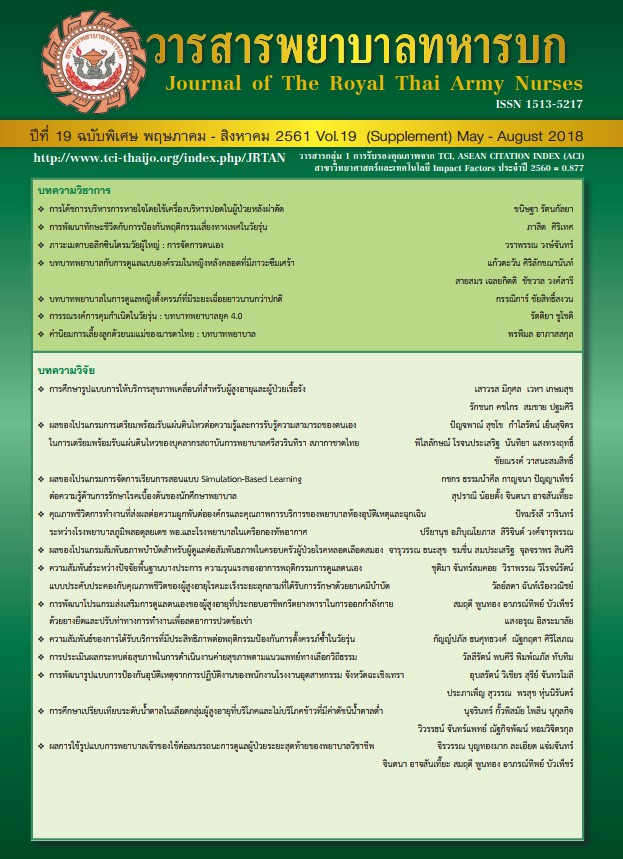The Impacts of a Health Promoting Program on Health-Related Quality of Life among Family Caregivers of Patients with Heart Failure
Keywords:
health promoting program, health-related quality of life, caregivers of patients with heart failureAbstract
This quasi-experimental research investigated impacts of a health promoting program on health-related quality of life among family caregivers of patients with heart failure. Subjects were equally assigned into either the control group or the experimental group, 30 in each group. The experimental group received the health promoting program for 12 weeks while the control group received the conventional gold standard nursing care. Research instruments included the family caregivers’ health-related quality of life questionnaire. Data were analyzed using Chi-square and t-test. The major results show that the mean score of family caregivers’ health-related quality of life in the group receiving the health promoting program was higher than that in the group receiving routine nursing care at a significant level of .05. In addition, the mean score of family caregivers’ health-related quality of life after receiving the health promoting program was higher than that before receiving the program at significant level lower than .001. The results provide evidence that health promoting program could improve family caregivers of patients with heart failure’s health-related quality of life. Therefore, this program should be further used in other family caregivers of other cardiovascular system.
Downloads
References
Lum HD, Lo D, Hooker S, Bekelman D. Caregiving in heart failure: Relationship quality is associated with caregiver benefit finding and caregiver burden. Heart Lung. 2014; 43(4): 30.
Susanna Å, Lorraine SE, Carina H, Anna S, Dyads affected by chronic heart failure: A randomized study evaluating effects of education and psychosocial support to patients with heart failure and their partners. J Card Fail. 2012; 18(5): 359-66.
Agren S, Berg S, Rolf Svedjeholm R, Strömberg A. Psychoeducational support to post cardiac surgery heart failure patients and their partners: A randomised pilot study. Intens Crit Care Nur. 2015; 31: 10-18.
Zhan L. Quality of life: conceptual and measurement issues. J Adv Nurs. 1992; 17(7): 795-800.
Saunders MM. Indicators of health-related quality of life in heart failure family caregivers. J Community Health Nurs. 2009; 26(4): 173-82.
Chiang LC, Chen WC, Dai YT, Ho YL. The effectiveness of telehealth care on caregiver burden, mastery of stress, and family function among
family caregivers of heart failure patients: A quasi-experimental study. Int J Nurs Stud. 2012; 49(10): 1230-42.
Pilot DF, Beck TB. Nursing research: Principle and methods. 7th ed. Philadelphia: Lippincott William & Wilkins; 2004.
Paorohit W, Booncharoenpanich S. Quality of Life of Air Force Retirees and Families with chronic illness received palliative care. Journal of The Royal Thai Army Nurses. 2017: 18(3); 244-9. (in Thai)
Petchroung N, Priyatruk P, Thongkeang V. The study of continuing care for patients with cerebrovascular disease in primary care unit. Journal of The Royal Thai Army Nurses. 2013: 14(1); 25-34. (in Thai)
Downloads
Published
How to Cite
Issue
Section
License
บทความหรือข้อคิดเห็นใดใดที่ปรากฏในวารสารพยาบาลทหารบกเป็นวรรณกรรมของผู้เขียน ซึ่งบรรณาธิการหรือสมาคมพยาบาลทหารบก ไม่จำเป็นต้องเห็นด้วย
บทความที่ได้รับการตีพิมพ์เป็นลิขสิทธิ์ของวารสารพยาบาลทหารบก
The ideas and opinions expressed in the Journal of The Royal Thai Army Nurses are those of the authors and not necessarily those
of the editor or Royal Thai Army Nurses Association.






